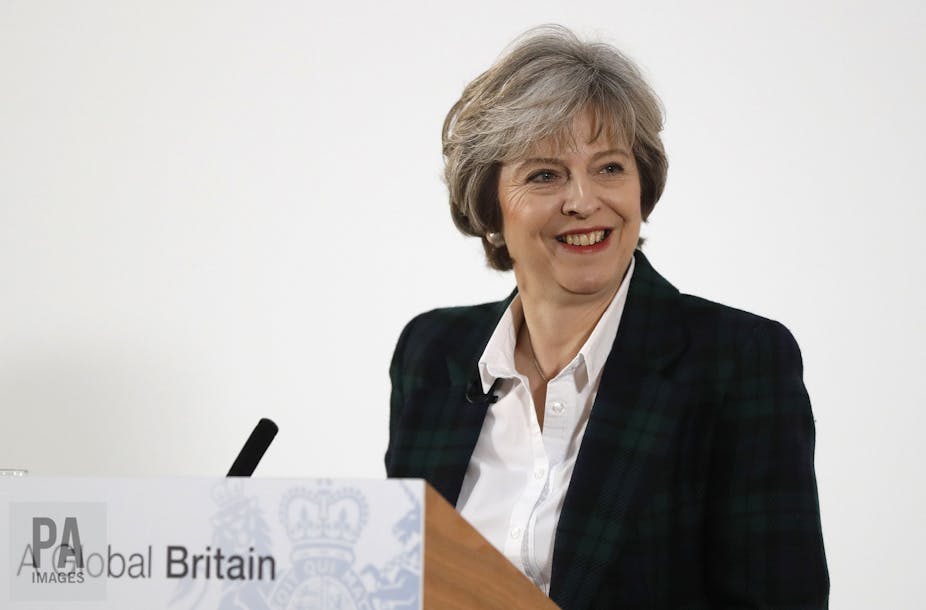Theresa May has confirmed that the UK intends to leave the EU’s single market and customs union. The consequences of this decision from a trade perspective should not be underestimated.
The single market has been the central feature of the European project from its very inception in the aftermath of World War II. The idea was to create a truly integrated market between EU member states by requiring them to remove barriers to trade in goods, services, persons and capital and adopting common rules and standards and the principle of mutual recognition for goods and services. It remains, to this day, the most ambitious and far-reaching economic integration project in the world.
Leaving the single market became an inevitability for the UK from the moment the Brexit referendum was framed as an outright rejection of one of its fundamental pillars: the free movement of people. While May has been at pains to stress that the referendum signalled the intent of the British electorate to control and limit migration from EU countries, the rest of the EU has maintained a united front that free movement is a non-negotiable requirement for single market membership.

This means, that not only does the UK intend to leave the EU, but also that it has abandoned any notion of a “soft Brexit” – that is, the possibility of leaving the EU to rejoin the European Free Trade Association (EFTA) and become a party to the European Economic Area (EEA). This is because the EEA is also part of the single market and subject to EU rules on free movement.
What does leaving the customs union mean?
May also signalled the UK’s intention to leave the EU customs union. The defining characteristic of a customs union is that it eliminates all barriers to trade within it and also controls how trade is carried out with external parties. This means that the EU currently applies a common external tariff and also conducts trade policy (including the negotiation of trade agreements) on behalf of its member states.
The UK’s ability to sign its own trade deals and, crucially, to set its own trade regime (including tariffs) has been portrayed by the government as one of the main benefits of leaving the EU. So staying within the EU customs union was always going to be a hard sell.
May did float the suggestion of negotiating what she referred to as a “customs agreement” with the EU, which would provide tariff-free access to the single market. However, this should not be confused with a customs union – an agreement focused on the elimination of tariffs would constitute a bog-standard free trade agreement – as the idea of a common tariff system has been dismissed.
What are the consequences?
In practical terms, leaving the single market and the customs union will mean vastly increased costs to doing business with the EU, which accounts for about 53% of UK imports and 48% of UK exports. Should the UK fall back on the rules of the World Trade Organisation (WTO), UK exporters will face tariffs and will no longer benefit from automatic recognition of “equivalent standards”. This means that goods will have to comply with relevant EU regulations and standards – and will be subject to certification costs to prove this.

Important UK service industries such as financial services would also be significantly affected, as they would no longer benefit from passporting rights, which allow financial companies to freely sell services across member states.
What are the alternatives?
To avoid falling off the WTO cliff-edge, May spoke of negotiating a “comprehensive free trade agreement” that would provide “the greatest possible access to the single market”. Such a bespoke agreement between the EU and the UK would lower the costs of leaving the single market, but it would take time to negotiate and important barriers to trade would still remain.
Even if the EU and the UK were able to negotiate tariff-free access, exporters would remain subject to border controls and administrative costs. They would also still have to navigate the complex world of “rules of origin”, which set the criteria used to determine the origin of a product and, in particular, which products can benefit from preferential tariff treatment negotiated under a trade agreement.
With respect to services, there are significant limits on what can reasonably be achieved. Most barriers to trade in services are regulatory in nature. The EU and the UK may seek what’s called “regulatory equivalence” in key service sectors, but the process that leads to the granting of equivalence can be lengthy. Also, the EU only grants equivalence in certain areas, and some services important to the UK, such as banking services, are excluded.
All of these are cumbersome and onerous obstacles, but not insurmountable. Not being a member of the single market does not mean losing access to the single market. Plus, plenty of non-EU countries trade successfully with the EU.
But adapting from the relative comfort of trading within the confines of a fully integrated market to trading on the basis of WTO rules (or even a free trade agreement) will present an extremely costly, time-consuming and unprecedented challenge for the UK.

